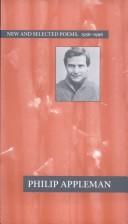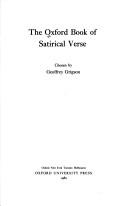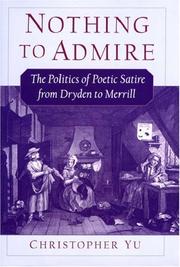| Listing 1 - 5 of 5 |
Sort by
|

ISBN: 1610752767 9781610752763 1557284199 9781557284198 1557284202 9781557284204 Year: 1996 Publisher: Fayetteville University of Arkansas Press
Abstract | Keywords | Export | Availability | Bookmark
 Loading...
Loading...Choose an application
- Reference Manager
- EndNote
- RefWorks (Direct export to RefWorks)
Verse satire, American. --- American verse satire --- American poetry

ISBN: 0192141104 9780192141101 Year: 1980 Publisher: Oxford Oxford university press
Abstract | Keywords | Export | Availability | Bookmark
 Loading...
Loading...Choose an application
- Reference Manager
- EndNote
- RefWorks (Direct export to RefWorks)
Verse satire, American --- Verse satire, English --- English verse satire --- English poetry --- American verse satire --- American poetry

ISBN: 0195155300 1423762932 0198035349 1280502320 1602569762 9781423762935 9781602569768 9781280502323 019772552X 0190288655 Year: 2023 Publisher: Oxford ; Oxford University Press,
Abstract | Keywords | Export | Availability | Bookmark
 Loading...
Loading...Choose an application
- Reference Manager
- EndNote
- RefWorks (Direct export to RefWorks)
This work argues for the persistence of a central tradition of poetic satire in English that extends from Restoration England to present-day America. The tradition is seen as rooted in the uses of Augustan metaphor to criticize the abuse of social and political power and to promote freedom of mind.
Merrill, James Ingram --- Criticism and interpretation --- Verse satire [American ] --- History and criticism --- Verse satire [English ] --- Political poetry [American ] --- Political poetry [English ] --- Verse satire, American --- Political poetry, American --- Politics and literature --- Political poetry, English --- Verse satire, English --- American verse satire --- American poetry --- Literature --- Literature and politics --- History and criticism. --- Political aspects --- Merrill, James, --- Merrill, Jim, --- Merrill, Jimmy, --- Criticism and interpretation.

ISBN: 9781469601083 1469601087 0807827150 9780807827154 0807853836 9780807853832 0807839051 9798890875037 Year: 2002 Publisher: Chapel Hill Published for the Omohundro Institute of Early American History and Culture, Williamsurg, Virginia, by the University of North Carolina Press
Abstract | Keywords | Export | Availability | Bookmark
 Loading...
Loading...Choose an application
- Reference Manager
- EndNote
- RefWorks (Direct export to RefWorks)
Faith in literature. --- Theology in literature. --- Religion in literature. --- Rationalism in literature. --- Belief and doubt in literature. --- Verse satire, American --- Christian poetry, American --- Freethinkers --- Christianity and literature --- Religion in drama --- Religion in poetry --- American verse satire --- American poetry --- Free thinkers --- Rationalists --- Literature and Christianity --- Literature --- Christian literature --- History and criticism. --- History --- Chauncy, Charles, --- Dwight, Timothy, --- In literature. --- T. W., --- W., T., --- Chauncey, Charles,
Book
ISBN: 0520922956 Year: 2000 Publisher: Berkeley, CA : University of California Press,
Abstract | Keywords | Export | Availability | Bookmark
 Loading...
Loading...Choose an application
- Reference Manager
- EndNote
- RefWorks (Direct export to RefWorks)
Examining contemporary poetry by way of ethnicity and gender, Kenneth Lincoln tracks the Renaissance invention of the Wild Man and the recurrent Adamic myth of the lost Garden. He discusses the first anthology of American Indian verse, The Path on the Rainbow (1918), which opened Jorge Luis Borges' university surveys of American literature, to thirty-five contemporary Indian poets who speak to, with, and against American mainstream bards. From Whitman's free verse, through the Greenwich Village Renaissance (sandwiched between the world wars) and the post-apocalyptic Beat incantations, to transglobal questions of tribe and verse at the century's close, Lincoln shows where we mine the mother lode of New World voices, what distinguishes American verse, which tales our poets sing and what inflections we hear in the rhythms, pitches, and parsings of native lines.Lincoln presents the Lakota concept of "singing with the heart of a bear" as poetry which moves through an artist. He argues for a fusion of estranged cultures, tribal and émigré, margin and mainstream, in detailing the ethnopoetics of Native American translation and the growing modernist concern for a "native" sense of the "makings" of American verse. This fascinating work represents a major new effort in understanding American and Native American literature, spirituality, and culture.
American poetry --- Indians of North America --- American poetry --- Indians in literature. --- Indian influences. --- Intellectual life. --- Indian authors --- History and criticism. --- american indian. --- american literature. --- american poetry. --- american verse. --- bible. --- biblical. --- contemporary poetry. --- culture. --- ethnicity. --- ethnopoetics. --- free verse. --- gender studies. --- gender. --- greenwich village. --- indigenous people. --- indigenous. --- lakota. --- literary analysis. --- literary criticism. --- lost garden. --- modernist. --- mythology. --- native american literature. --- native american. --- native literature. --- new world. --- poetic criticism. --- poetic verse. --- poetry analysis. --- poetry studies. --- renaissance. --- spirituality. --- translation.
| Listing 1 - 5 of 5 |
Sort by
|

 Search
Search Feedback
Feedback About UniCat
About UniCat  Help
Help News
News